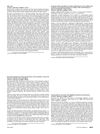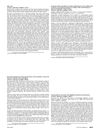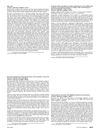 76 citations,
March 2005 in “Journal of Molecular Medicine”
76 citations,
March 2005 in “Journal of Molecular Medicine” Certain mice without specific receptors or mast cells don't lose hair from stress.
[object Object]  March 2012 in “Journal of The American Academy of Dermatology”
March 2012 in “Journal of The American Academy of Dermatology” Hair casts are often mistaken for head lice, scalp pain in hair loss is linked to certain nerve factors, eyelash growth treatment is safe and effective, and nail shedding in children may follow hand-foot-mouth disease.
 1 citations,
February 2023 in “Daehan ui'sa hyeobhoeji/Daehan uisa hyeopoeji”
1 citations,
February 2023 in “Daehan ui'sa hyeobhoeji/Daehan uisa hyeopoeji” Primary healthcare clinics are key in managing chemotherapy side effects using various medications and treatments.
 March 2012 in “Journal of The American Academy of Dermatology”
March 2012 in “Journal of The American Academy of Dermatology” Higher levels of certain nerve-related proteins are linked to hair loss in women with scalp pain.
 March 2012 in “Journal of The American Academy of Dermatology”
March 2012 in “Journal of The American Academy of Dermatology” Hand-foot-mouth disease may cause nail loss in children.
 56 citations,
November 2010 in “Pigment Cell & Melanoma Research”
56 citations,
November 2010 in “Pigment Cell & Melanoma Research” Brain hormones significantly affect hair color and could potentially be used to prevent or reverse grey hair.
124 citations,
January 2012 in “Journal of Allergy and Clinical Immunology” Endocannabinoids help control mast cell activity in human skin.
 97 citations,
March 2009 in “Dermato-endocrinology”
97 citations,
March 2009 in “Dermato-endocrinology” Hormones significantly affect hair and oil gland function in the skin, and more research is needed on skin-related hormone disorders.
 15 citations,
August 2020 in “American Journal of Pathology”
15 citations,
August 2020 in “American Journal of Pathology” Insulin helps heal corneal wounds and nerves in diabetic mice by activating the Wnt signaling pathway.
 4 citations,
May 2021 in “Biomedicines”
4 citations,
May 2021 in “Biomedicines” Targeting the protein Caveolin-1 might help treat a type of scarring hair loss called Frontal Fibrosing Alopecia.
 127 citations,
December 2005 in “Experimental Dermatology”
127 citations,
December 2005 in “Experimental Dermatology” Stress can stop hair growth in mice, and treatments can reverse this effect.
 80 citations,
April 2018 in “Trends in Molecular Medicine”
80 citations,
April 2018 in “Trends in Molecular Medicine” Lichen Planopilaris and Frontal Fibrosing Alopecia may help us understand hair follicle stem cell disorders and suggest new treatments.
 159 citations,
December 2007 in “American Journal of Pathology”
159 citations,
December 2007 in “American Journal of Pathology” Stress-related substance P may lead to hair loss and negatively affect hair growth.
 125 citations,
September 2001 in “The FASEB Journal”
125 citations,
September 2001 in “The FASEB Journal” Stress can cause hair loss by negatively affecting hair follicles and this effect might be reversed with specific treatments.
 September 2004 in “Experimental dermatology”
September 2004 in “Experimental dermatology” Melatonin directly affects mouse hair follicles and may influence hair growth.
140 citations,
February 2014 in “Neuron” Delta opioid receptors help regulate touch sensation by reducing neurotransmitter release in the spinal cord.
 29 citations,
September 2017 in “Oncology and therapy”
29 citations,
September 2017 in “Oncology and therapy” The document provides advice on how to recognize and treat skin-related side effects of cancer drugs known as EGFR inhibitors.
 4 citations,
February 2022 in “Frontiers in molecular biosciences”
4 citations,
February 2022 in “Frontiers in molecular biosciences” Chronic stress in mice changes skin metabolism and gene expression, leading to hair loss.
1 citations,
November 2023 in “International journal of molecular sciences” Cannabinoids might help treat skin problems but more research is needed to be sure.
 192 citations,
January 2015 in “Journal of the American Academy of Dermatology”
192 citations,
January 2015 in “Journal of the American Academy of Dermatology” Targeted cancer therapies often cause serious skin problems that need careful management.
 30 citations,
October 2016 in “Current research in translational medicine”
30 citations,
October 2016 in “Current research in translational medicine” Hair follicles on the scalp interact with and respond to the nervous system, influencing their own behavior and growth.
 March 2012 in “Journal of The American Academy of Dermatology”
March 2012 in “Journal of The American Academy of Dermatology” Latisse is safe and effective for long-term eyelash growth in people with thin eyelashes from chemotherapy or unknown causes.
 98 citations,
July 2014 in “Trends in Molecular Medicine”
98 citations,
July 2014 in “Trends in Molecular Medicine” Hair follicles are hormone-sensitive and involved in growth and other functions, with potential for new treatments, but more research is needed.
 3 citations,
August 2023 in “Drug safety”
3 citations,
August 2023 in “Drug safety” Proactive monitoring and management are essential to maximize the benefits of Trastuzumab Deruxtecan while minimizing serious side effects.
 January 2020 in “Journal of The European Academy of Dermatology and Venereology”
January 2020 in “Journal of The European Academy of Dermatology and Venereology” In 2019, dermatology and venereology improved skin cancer imaging, advanced in treating skin conditions like psoriasis, and explored the skin microbiome's role in diseases.

Female rats showed more panic-related behavior than males, influenced by hormonal cycles and certain drugs.
61 citations,
October 2011 in “Experimental dermatology” Scalp itching is common and hard to diagnose due to the complex nerve structure of the scalp.
 2 citations,
July 2022 in “Frontiers in Medicine”
2 citations,
July 2022 in “Frontiers in Medicine” The cause of Frontal fibrosing alopecia, a type of hair loss, is complex, likely involving immune responses and genetics, but is not fully understood.
[object Object]  46 citations,
April 2008 in “Archives of Dermatological Research”
46 citations,
April 2008 in “Archives of Dermatological Research” Substance P may worsen acne by increasing inflammation, but corticosteroids might help by reducing this effect.
 27 citations,
January 2020 in “Experimental Dermatology”
27 citations,
January 2020 in “Experimental Dermatology” Immune cells affect hair growth and could lead to new hair loss treatments.


























